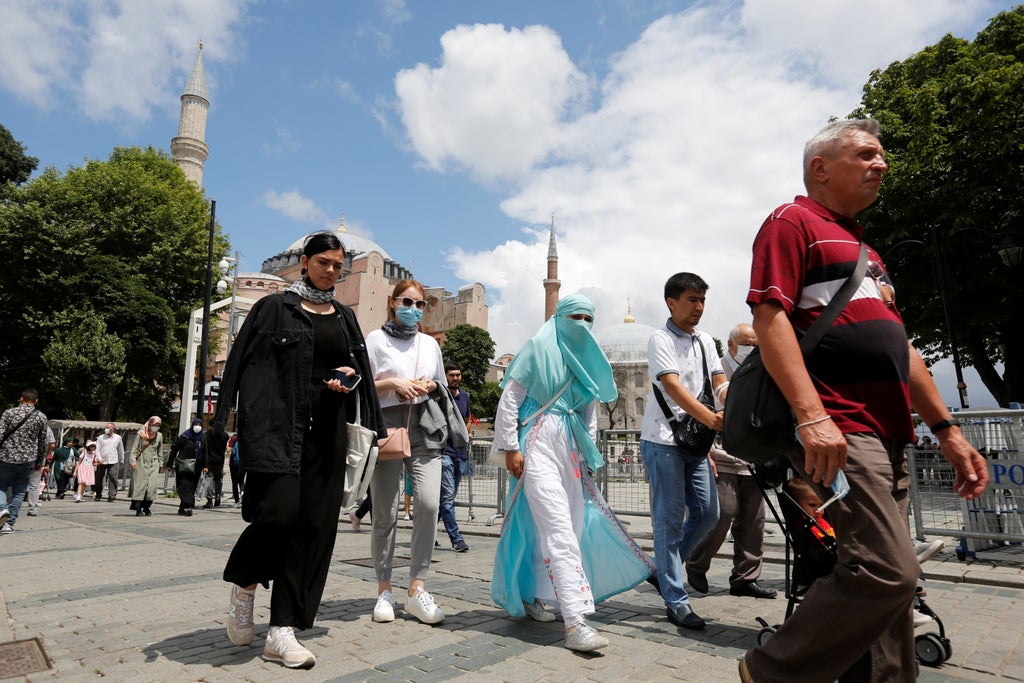[ad_1]
Arab visitors attracted by quarantine-free travel and a cheap lira are helping bolster a rebound for Turkey’s tourism industry, as it struggles to plug the gap left by Britons, for whom the country remains off limits.
Holidaying with his family in Istanbul, Jordanian Omar Zahra, 48, said flying there from Amman was a better choice than Gulf destinations, where a failed Covid-19 test would lead to quarantine, or ones in the European Union, which briefly banned travellers from Jordan.
“You don’t have to go to Europe. It is a lot more expensive … and they still have some restrictions,†he said this week on a Bosphorus strait boat tour as nine Jordanians sipped Turkish coffee and snapped pictures of Ottoman-era palaces.
His sister Muna Abuzahra asked the tour guide whether they would sail near the Abud Efendi Yalisi waterside villa, where the Turkish TV series “Noor†– one of the most popular in Arab countries – is filmed.
“This is the best place to go for price, culture, nature, food and weather,†Mr Zahra added.
Turkey’s tourism sector accounts for up to 12 per cent of the economy and is a key source of foreign revenue to offset big trade imbalances.
Last year it got hammered by fallout from the coronavirus. This year activity is forecast to return closer to pre-pandemic levels, despite early-season cancellations after a surge in Covid-19 cases prompted a partial lockdown in May.
In the first week of July, airport passenger numbers were at their highest since the pandemic struck, according to the State Airports Authority.
Flights from Russia, Turkey’s biggest source of holidaymakers, re-started last month and Germans, the second-biggest source, are also making reservations, travel industry executives say.
But the absence of Britons, for whom it remains a red list destination restricted for all but essential travel, in part meant Turkey’s international air traffic was still down 52 per cent in June compared with June 2019.
Meanwhile, quarantine-free travel and a lira that has fallen more than 50 per cent versus the dollar in the last three years, has boosted demand from the Middle East, executives say.
“We see a huge demand and high-budget reservations from Jordan… For now it seems to be our top market in the region,†said Serdar Ali Abet, chairman of Karnak Travel, which mainly specialises in Gulf and Middle East markets.
With holiday traffic from Qatar and the Palestinian Territories also on the rise, he estimated Arab holidaymakers would reach 50 per cent of pre-pandemic levels this year, held back in part by political friction with Saudi Arabia and the UAE and by Lebanon’s economic crisis.
Citing demand also from Kuwait, Ulkay Atmaca, general manager of Innvista Hotels Belek, said Turkey’s Mediterranean hotels were doing better than expected, though reaching 2019 levels this year was not possible.
Jordanian Abuzahra had returned after vacationing in Antalya a few years ago.
“We heard about Istanbul so much,†she said. “If you want to go to (Jordan’s) Bethany, the Dead Sea or to Aqaba you’ll spend much more than here. It is good choice and good price.â€
Reuters
[ad_2]
Source link





